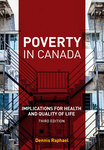We don’t actively support Internet Explorer
It appears that you are using Internet Explorer, which has been discontinued by Microsoft. Support has ended for versions older than 11, and as a result you may face security issues and other problems when using it.
We recommend upgrading to a newer browser such as Firefox, Google Chrome, or Edge for a much better experience across the web.
While this site may work with Explorer, we are not testing and verifying it, so you may run into some trouble or strange looking things.
Poverty, Mental Health, and Social Inclusion
Edited by Cheryl Forchuk, Rick Csiernik

Subjects
Health Policy / Health Studies / Mental Health and Addictions / Social Work / Sociology / Sociology of FamilyMarch 2021
Print ISBN: 9781773382234
Overview
Poverty, Mental Health, and Social Inclusion offers a comprehensive selection of chapters written by academic researchers as well as direct practitioners and mental health consumer-survivors to examine the intersection of poverty, mental health, and social exclusion. With the aim of addressing complex issues, from homelessness and housing to stigma and mental health, the volume presents the perspectives of a wide range of those affected by poverty and social exclusion including Canadian veterans, Indigenous women, homeless youth and families, and mental health consumer-survivors. Divided into four sections, the chapters explore the effects of social exclusion, examine the trajectory of how it occurs, analyze harmful policies in place that exacerbate the correlation between poverty and mental health issues, and introduce potential solutions to expand social inclusion to marginalized groups.
Accessibly written, this text will be a valuable resource for courses on mental health, poverty, and social policy across the disciplines of social work, sociology, and health studies at both the graduate and undergraduate level.
FEATURES
- includes research that represents the lived experiences of those living in poverty and homelessness, organized in a narrative framework
- covers a wide range of issues related to social inclusion, exclusion, and mental health
- provides a critical overview of current housing, income support, and mental health policies and their effectiveness
Table of Contents
Preface
Acknowledgements
Section I: Introduction
Chapter 1: The Unspoken Intersection of Mental Illness and Poverty: Social Exclusion
Sebastian Gyamfi, Cheryl Forchuk, and Rick Csiernik
Chapter 2: Creating Social Exclusion: The Disconnection between Housing, Income Support, and Mental Health Policies
Rick Csiernik, Cheryl Forchuk, Katherine Turner, Libbey Joplin, Ruth Schofield, and Carolyn Gorlick
Chapter 3: Playing Musical Chairs: Understanding How to End Homelessness
Cheryl Forchuk
Section II: Methodological Issues
Chapter 4: Doing Participatory Action Research
Cheryl Forchuk
Chapter 5: The Article Idea Chart: A Participatory Action Research Tool to Aid Involvement in Dissemination
Cheryl Forchuk and Amanda Meier
Chapter 6: Strategies for Retaining a Sample of Homeless Youth
Cheryl Forchuk, Tony O’Regan, Momodou Jeng, and Amanda Wright
Chapter 7: The Stigma Scale: A Canadian Perspective
Amanda Meier, Rick Csiernik, Cheryl Forchuk, and Laura Warner
Section III: Becoming Socially Excluded
Chapter 8: Poverty Trajectories Experienced by Persons with Mental Illness
Cheryl Forchuk, Phyllis Montgomery, Abraham Rudnick, Pam Lahey, Benita Cohen, Ruth Schofield, Stewart E. Perry, Robin Coatsworth-Puspoky, Betty Edwards, Bethany Butzer, and Amanda Meier
Chapter 9: Using a Capabilities Approach to Understand Poverty and Social Inclusion of Mental Health Consumer-Survivors
Sarah Benbow, Abraham Rudnick, Cheryl Forchuk, and Betty Edwards
Chapter 10: “Until You Hit Rock Bottom There’s No Support”: Contradictory Sources and Systems of Support for Mothers Experiencing Homelessness in Southwestern Ontario
Sarah Benbow, Cheryl Forchuk, Carolyn Gorlick, Helene Berman, and Catherine Ward-Griffin
Chapter 11: Sheltering Indigenous Women with Mental Illness in Ontario: Being “Kicked” and Nurtured
Phyllis Montgomery, Sarah Benbow, Laura Hall, Denise Newton-Mathur, Cheryl Forchuk, and Sharolyn Mossey
Chapter 12: The Mental Health of Those Who Serve Canada: A Reflection
Major Steven D. Pirie
Chapter 13: Addressing Homelessness among Canadian Veterans
Cheryl Forchuk, Jan Richardson, and Heather Atyeo
Section IV: Creating Social Inclusion
Chapter 14: Peer Support as a Direct Benefit of Focus Group Research
Cheryl Forchuk, Amanda Meier, Phyllis Montgomery, and Abraham Rudnick
Chapter 15: Seeking and Securing Work: Individual-Level Predictors of Employment of Mental Health Consumer-Survivors
Peter V. Hall, Phyllis Montgomery, Samantha Davie, Kevin Dickins, Cheryl Forchuk, Momodou Jeng, Melissa Kersey, Amanda Meier, Pam Lahey, Abraham Rudnick, Michelle Solomon, and Laura Warner
Chapter 16: Iris Scanning: A Solution to the Lost Identification Problem Encountered by People Experiencing Homelessness?
Cheryl Forchuk, Lorie Donelle, Miriam Capretz, Fatima Bukair, and John Kok
Chapter 17: The Effectiveness of a Shelter Diversion Intervention for Families Who Experience Homelessness
Cheryl Forchuk, Jan Richardson, Gordon Russell, Chantelle Perreault, Bryanna Lucyk, and Annie Yang
Chapter 18: Preventing Mental Illness Discharge to Homelessness
Cheryl Forchuk, Mike Godin, Jeffry Hoch, Shani Kingston-MacClure, Momodou Jeng, Liz Puddy, Rebecca Vann, and Elsabeth Jensen
Chapter 19: An Evaluation of the London Community Addiction Response Strategy: London CAReS
Cheryl Forchuk, Rick Csiernik, Grant Martin, Laura Warner, Abe Oudshoorn, Wafa’a Ta’an, and Jan Richardson
Chapter 20: Service Preferences of Homeless Youth with Mental Health Issues: Housing First, Treatment First, or Both Together
Cheryl Forchuk, Rick Csiernik, Jan Richardson, Karen Laverty, Mirella Bryant, Abraham Rudnick, Betty Edwards, Sandra Fisman, Beth Mitchell, Martha Connoy, Mark Dolson, and Chandell Kelly
Author Biographies






